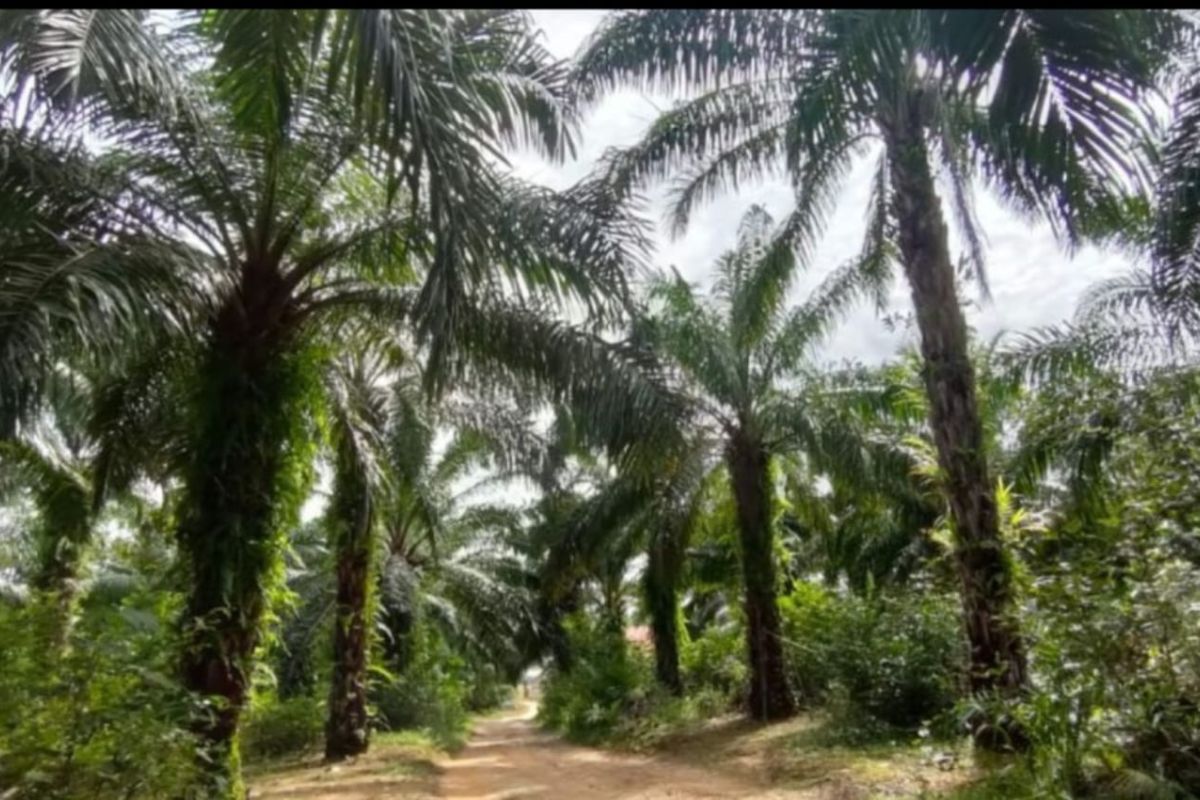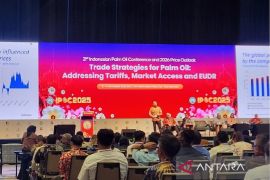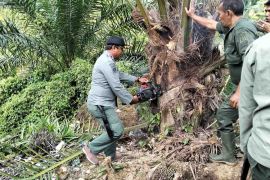Jakarta (ANTARA) - The agricultural sector has been playing important role in Indonesian national economics life. One of the promising sectors that has been contributing significantly to national income is palm oil. Along with its robust growth, the development of palm oil invites controversy in the international community pertaining to social, environmental, and lastly land tenurial issues. The growing negative campaign amplifying negative issues has triggered numbers of western countries to boycott palm oil imports. These problems are currently being addressed by the emergence of certified sustainable palm oil from which the indicator is used in Indonesia currently by Indonesian Sustainable Palm Oil (ISPO).
ISPO scheme was first introduced to public in 2011 through the launching of Minister of Agricultural Regulation No. 19 of 2011. This scheme reflected Indonesian government’s commitment in improving the governance of palm oil estate governance to meet the standard of sustainability. In its first years, ISPO is obliged to be followed by all palm oil companies, but the inception of regulation no. 44 of 2020 has mandated to all growers including smallholders to be certified by ISPO at the latest by 2025. As a standard of good palm oil practices, ISPO adopts the concept of sustainable business which delivers mutual benefit to economics, social, and environmental aspects. The Implementation of ISPO is not only for estate activities but broader in palm-oil based downstream industries.
Apart from its noble aim to level up local palm oil quality, implementation of ISPO still encounters problems that potentially discourage producer’s willingness to join. First, according to preceding research in a few local companies found ISPO requires higher standard of farming practice. Growers experienced additional cost in average by 13% which mostly sourced from maintenance and supervising besides the certification and annual surveillance cost by ISPO certification body. That cost increase, until nowadays, has been neither appreciated in the market as a premium product nor compensated in pricing by regulation. Second, there are still many growers who are not prepared to have ISPO as a mandatory mainly from smallholders. Indication of land area in forest, no agricultural business license from authoritative body, and lack of good agricultural practice are the most common factors found which keep smallholders far away from ISPO certification. Question then arises accordingly of how market would react to ISPO as mandatory program in 2025, would ISPO be perceived as a leverage or another burden to industry.
Theoretically, the market is perceived to be economically efficient when aggregate consumer and producer have maximized surplus at particular equilibrium point. The nature of palm oil market shows demand is overpowering supply as the consequence of long-producing trees which force farmers to keep selling crops at any price. This promotes demand to be more price-sensitive than supply. The presence of ISPO by sense will be perceived as a market inefficiency since its nature impacts the change of market equilibrium. Suppliers are forced to adapt by changing cost structure while buyers must decide either to accept the consequence of price increase or exit the market and find another “good deal” product. To answer the questions above following scenarios are prepared to forecast market reactions from both supply and demand side towards ISPO implementation in 2025.

Scenario 1 Government obligates ISPO as the only standard for palm oil.
In this scenario the government compensates additional cost from ISPO implementation in fresh fruit bunch (FFB) selling price regulation. Regulation of trading restriction is also applied to enforce single standard of Indonesian palm oil by using ISPO. This scenario would lead to a change in market where the cost structure of production is affected and appreciates selling price. Meanwhile, the scarcity of selling units is potentially to occur as an impact of huge drop from smallholders’ contribution due to the entry standard created by ISPO. As in the illustration, the change of cost structure is represented by the shifting line of supply from S to S1 which indicates Indonesia cost palm oil production higher to reach better quality. The shrinking volume of supplies from smallholders is represented by the unit drop from Q0 to Q1. Therefore, the selling price is experiencing an increase from P0 to P1 from which a new equilibrium in the market is established from point A to B.
In a glance, from price perspective, scenario 1 shows ISPO results a positive trend in rebranding palm oil product more premium by implementing sustainability aspects. However, there are still issues to encounter prior to reach that conclusion such as (1) How many precisely the buyer of sustainability?, (2) Do those sustainability-buyers acknowledge ISPO as a trusted certification?, and (3) How the non-ISPO product would respond to the barrier of trade from ISPO?. Those questions are relevant since currently the EU is the only buyer that requires strict criteria of sustainability on imported agricultural products. Other main export-destination countries such as China, India, and Pakistan are more “price-sensitive” rather than exposing preference to sustainable-product label. Furthermore, ISPO still has no worldwide recognition particularly in the EU market to address sustainability issues. Less response from foreign buyers to ISPO in addressing sustainability issues automatically brings instant burden to local growers which its additional cost is not being appreciated by higher selling price. Meanwhile, a new illegal market is potentially to emerge to absorb smallholders’ stock at depreciated price. This price is predicted to be much lower than smallholders receive before the mandatory of ISPO. Gradually, growers would exit the market and change the crops since palm oil is no longer a favorable business. As a consequence, there would be a scarcity of palm oil stock from which buyers are pushed to alter preference into alternative vegetable oils. From this point, palm oil is completely abandoned by its players which drags its market share down lower than current level (as in illustration the new market equilibrium represented by point c).
Scenario 2 ISPO is just an option.
ISPO is not mandatory but rather than just a voluntary program for suppliers who are willing to upgrade their product with sustainability label. As compensation, the government gives incentive through higher selling price in contrast to products without ISPO. In economics perspective, this scenario is called profit optimizing strategy where suppliers precisely know the character of buyers and can group them therefore price is discriminated to maximize potential surplus from trading of each group of buyers. By having ISPO label, suppliers are expecting they would have seized sustainable-concern market and charging them higher price for premium product. This is supposed to be a win-win for both suppliers and buyers since there is no force for suppliers to meet a set of products standard and buyers have flexibility in choosing type of products. Back to the illustration, in this scenario, suppliers are creating 2 distinct cost structures where ISPO and non ISPO products are represented by line S1 and S respectively. By holding constant demand on palm oil, buyers are divided into 2 groups, purchasers of ISPO and non-ISPO which are demanding palm oil as many as Q1 unit and Q1-Q0 unit, respectively. The interaction of those groups of demand-supply are dividing the market of palm oil in two which are represented by point A (the non-ISPO market) and B (the ISPO market) at the same time.
In aggregate, there is no change of palm oil market share, yet there is an increase of surplus value from growers due to ISPO market. This case is proven by implementing ISPO as an option industry is successfully leveraging surplus from potential demand in sustainability market. However, this scenario may not be viable if the same issue as in the first scenario continues to occur. Questions of who are willing to buy sustainable product with higher price as compensation and to what extend international market is accepting ISPO as trusted sustainable palm oil certification need to address prior the conclusion above is reached. If those issues have not been resolved, market ISPO as represented at point B in illustration would not really be realized. Suppliers would perceive ISPO as a less effective procedure since its higher selling price as regulated by the government has no positive respond from buyers which are expecting palm oil to be sold at P0 or at the same price as non-ISPO product. Subconsciously, since there is no obligation, ISPO would not be preferable by growers to optimize their margin. They would prefer to stay in current market (the non ISPO) or targeting another certification that is acknowledged by the EU market instead of ISPO.
According to both scenarios above, massive promotion of ISPO from all aspects is the ultimate recommendation rather than focusing on gathering as many as member of ISPO. Industry would respond to ISPO regulation as a burden if extra cost that they spend is not reflected by the increase of their business value. Through a well-planned promotion, ISPO could be creating its market as many as its member will increase accordingly. Secondly, the improvement of good agricultural practices is truly urgent to be realized. In this case, smallholders are always the common-victims that always being a headline in every discussion. It is agreed that government intervention is necessary to support smallholders to keep up to sustainability demand. However, intervention is not just all about financial term, but it must be in a set of programs covering assistance of farming practices in daily basis, access to premium seedlings and fertilizers, and the most important is inter-ministerial coordination to sort out land conflict. Through that rigorous program, the government targets to carry out smallholders business to be commercial and independent. The last is, simplification of bureaucracy of agricultural governance. Currently, ISPO is not the only pre-requirement for palm oil business. Prior to that, Certificate of Registration of Plantation Cultivation or so called by STDB is commonly known around palm oil industry as the first level of entry permit into agricultural business. By law, this certificate is released by the district office of plantation and agriculture (Dinas Perkebunan Kabupaten) which is aiming the government to ensure that the proposed plantation has meet all good agricultural practices criteria. Essentially, aspects required in STDB are covered in ISPO criteria, so that there would be a redundancy of procedure by imposing growers taking ISPO. Therefore, simplification of this red tape would be another non-financial incentive to industry that could save budget and time.
Reporter: PR Wire
Editor: PR Wire
Copyright © ANTARA 2023












